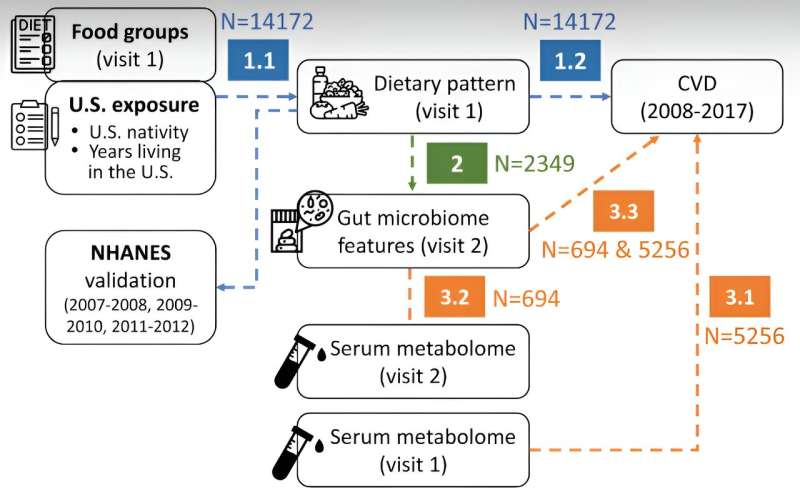This article has been reviewed according to Science X's editorial process and policies. Editors have highlighted the following attributes while ensuring the content's credibility:
fact-checked
peer-reviewed publication
trusted source
proofread
Analyzing the effects of dietary acculturation on heart health

Dietary acculturation may increase the risk of heart disease for people of Hispanic or Latino heritage in the U.S., according to a study published in Circulation.
People of Hispanic or Latino heritage make up 19% of the U.S. population, according to the U.S. Census Bureau, but have disproportionately higher rates of cardiovascular disease compared to national averages.
While it's generally accepted that dietary acculturation—or the adoption of a dominant culture's diet by migrant groups—influences health, the effects it has on heart health are not well understood, said Linda Van Horn, Ph.D., RD, professor of Preventive Medicine and chief of the Division of Nutrition, who was a co-author of the study.
In the study, more than 14,000 people of Hispanic and Latino heritage participated in a series of assessments over 15 years. Study participants logged the food they ate and provided blood and stool samples. Investigators then assigned a dietary acculturation score to participants according to how long they had been in the U.S.
Next, investigators analyzed rates of heart disease among study participants and found that higher dietary acculturation was associated with an increased risk of heart disease and cardiovascular events. Study participants who had higher dietary acculturation also had more metabolic changes linked to cardiovascular disease, according to the study.
The findings show that adopting different dietary patterns can impact the health of people with Hispanic and Latino ancestry, particularly if they alter their original diet high in fruits, vegetables and whole grains to a diet with more fried, processed and salty foods, Van Horn said.
"This is a very interesting and high-profile study that is providing some new and ongoing data collected regarding health, disparities and social determinants of the health among more versus less acculturated and educated participants and their families," Van Horn said.
Moving forward, Van Horn and her colleagues will continue to study the effects of dietary acculturation on heart health.
"There is great interest nationwide in perpetuating this study over the next five years," Van Horn said. "The study has been greatly expanded to include the offspring, siblings and other members of the families of the originally recruited and enrolled participants. My area of greatest interest is in diet-related risk factors, dietary assessments and acculturation."
More information: Yi Wang et al, Dietary Acculturation Is Associated With Altered Gut Microbiome, Circulating Metabolites, and Cardiovascular Disease Risk in US Hispanics and Latinos: Results From HCHS/SOL, Circulation (2024). DOI: 10.1161/CIRCULATIONAHA.124.069824



















